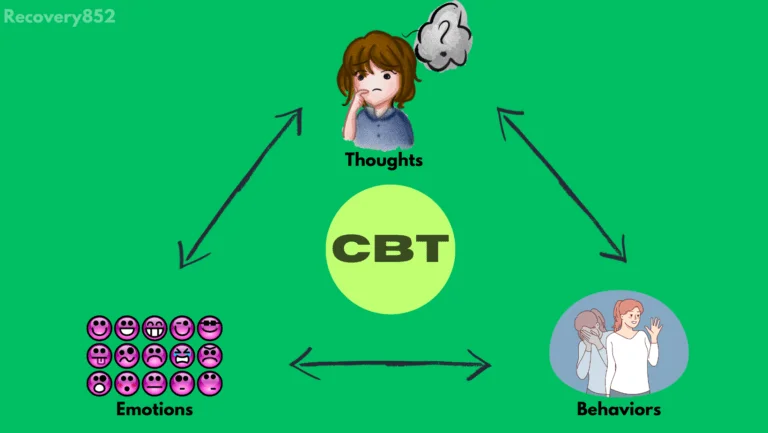Table of Contents
ToggleCognitive Behavioral Therapy (CBT) For Addiction Recovery
Cognitive Behavioral Therapy (CBT) is a form of psychotherapy that focuses on the relationship between thoughts, emotions and behaviors. It is commonly used to treat various mental health conditions, including addiction.
Addiction is a chronic condition characterized by compulsive drug seeking and use despite harmful consequences. A combination of genetic, environmental, and psychological factors can cause it. CBT is an effective treatment for addiction because it addresses the underlying thoughts and beliefs contributing to it.
CBT for addiction typically involves identifying and changing negative thoughts and beliefs about substance use and process addictions or behavioral addictions. The therapist will work with the patient to identify triggers for substance use and develop coping strategies to avoid or manage them. This therapy may include techniques such as exposure therapy, in which the patient is gradually exposed to triggers in a controlled environment to build tolerance, and cognitive restructuring, in which the patient learns to challenge and change negative thoughts and beliefs.

The Core Principles Of CBT Include :
2. Behavioral Techniques: This therapy often incorporates behavioral strategies tailored to address specific issues. Examples include exposure therapy for phobias or systematic desensitization to mitigate anxiety-related behaviors.
3. Goal-Oriented and Time-Limited: This therapy typically operates within a short-term, goal-oriented framework. The emphasis lies on empowering individuals to develop practical coping strategies and problem-solving skills to navigate their current challenges.
4. Collaborative and Active: This therapy is characterized by a collaborative process between the therapist and the individual. It is an interactive therapy, encouraging individuals to actively participate in identifying and modifying their thoughts and behaviors.
5. Homework Assignments: Individuals engaging in this therapy may receive homework assignments aimed at practicing and reinforcing the skills acquired during therapy sessions. This approach facilitates the integration of new coping strategies into their daily lives.
CBT has consistently demonstrated its effectiveness in treating a diverse array of psychological disorders. It is frequently utilized either independently or in conjunction with other therapeutic methods or medications. The underlying principle of this therapy is rooted in the belief that altering maladaptive thought patterns can precipitate changes in emotional experiences and behaviors, ultimately enhancing overall mental well-being.
CBT can be used alone or in combination with other treatments, such as medication-assisted or 12-step programs. It is an evidence-based approach that has been shown to reduce substance use and improve overall well-being effectively. It is a relatively short-term treatment, usually lasting about 12-20 sessions, and it can be delivered in individual or group settings. It is a collaborative process between the therapist and the patient and requires active participation from the patient.
Overall, Cognitive Behavioral Therapy is a widely accepted and effective treatment for addiction. It addresses underlying thoughts and beliefs contributing to addiction and gives the patients the tools to manage triggers and avoid relapse. The founder and lead clinician at Recovery852 use a combination of evidence-based interventions. CBT provides practical tools to help clients deal with automatic thoughts and impulses to act out.
- Different Types of Addiction
- Support Network In Recovery From Addiction
- Effective Treatment for Addictive Behaviours
- Cognitive Behavioural Therapy For Addiction
- Setting Realistic And Reachable Wellness Goals In Recovery
- How Addiction Affects Families
- Sober Curious: A Movement For Change
- The Five Rules Of Recovery
- What Is Acceptance and Commitment Therapy?
- Mental Health 102: Understanding Depression
- Unpacking Wine Mom Culture
- The Dangers of Addiction Replacement
- Nurtured By Nature: Nature In Addiction Recovery
- The 12 Steps For Atheists
- A Deeper Look Into Dual Diagnosis
- Financial Wellness in Addiction Recovery
- How Does Stress Affect Addiction?
- Mental Health 101: Understanding Anxiety Disorders
- Talking About Marijuana Use Disorder
- Yoga Practices in Addiction Recovery